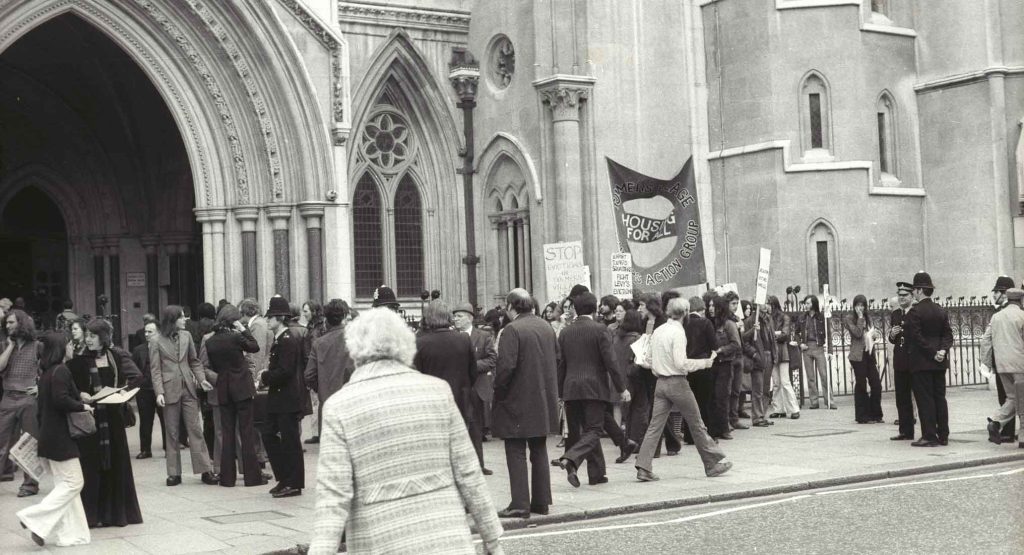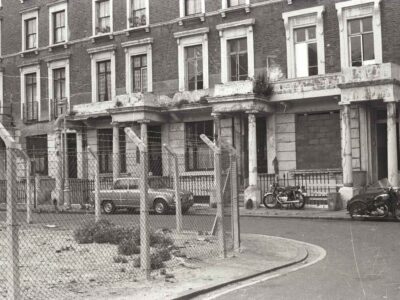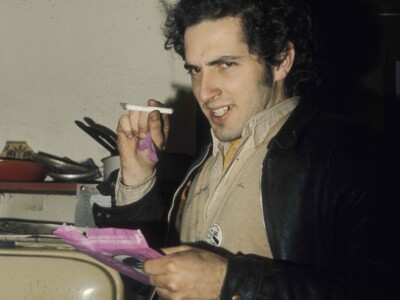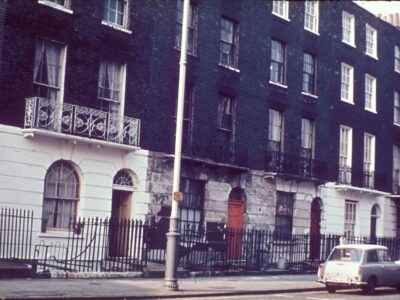As told to Patrick Allen
In 1975 I was asked by Patrick Allen of Offenbach & Co Solicitors to advise the Tolmers Square squatters who were threatened with eviction by Stock Conversion. I was a barrister and had been called to the bar in 1972, so at the time I had just three years experience in practice. I was a member of the ground breaking Bowden Street Chambers, Lambeth, the first chambers to be set up in a local area outside of the Inns of Court and the first chambers where members agreed to share their fees with each other.
Housing law was always part of my practice and eventually became the sole focus of my work from the 1980s. But in 1975 I had quite a broad practice which included employment tribunals, personal injury work and criminal jury trials. I got into squatting law because the court rules governing the procedure for eviction of squatters – Order 113 of the High Court rules and Order 26 of the County Court rules – came into force when I was doing the bar finals course and I became familiar with them.
At that time I had got to know people involved in campaigning on homelessness issues. I acted as a “McKenzie friend” for some of them who were squatting in Islington and Camden during the court hearings when the property owners were applying for eviction (McKenzie v M was the name of a case in which the Court of Appeal had decided that a litigant who was not represented by a solicitor or barrister was entitled to have someone with him/her to act as his/her note-taker and adviser). One of those involved was Sid Rawle, who was prominent in the squatting and counter culture movement.
So I was involved in squatting cases before I became qualified to represent clients in court (which happens after six months training or “pupillage” with a practising barrister who, in my case, was Lord Anthony (Tony) Gifford, the radical peer who became head of Bowden Street, later Wellington Street, Chambers). When I qualified, people remembered me and asked their solicitors to send me instructions on squatting cases.
Patrick Allen says that I came to a meeting with the Tolmers squatters one Saturday in Tolmers Square wearing a green army great coat. This is very likely although I don’t now remember this meeting! It was always my practice to visit the property which was the subject of cases and I lived not far away from Tolmers Square. I remember fondly the greatcoat which I had bought at Lawrence Corner, the army surplus shop on the corner of Drummond Street and Hampstead Road and a few yards away from Tolmers Square. It was very heavy and its buttons still shone.
In law, squatters are trespassers and therefore they have no right to be in occupation of the property concerned. But in order to obtain an eviction (possession) order, the landowner had to comply with Court procedure. So in the Tolmers case I advised that we attack the possession summonses on the grounds of procedural deficiencies and failure to comply with Order 113. And Patrick prepared many affidavits from squatters containing evidence of non-compliance which were submitted to the court.
There is a certain irony here as O113/026 were themselves introduced to make it easier for landowners to evict because of problems with the previous procedure.
At the time it was a requirement of those rules that the claimant/landowner (at that time described as the Plaintiff) take ‘reasonable steps’ to identify the occupiers of the property, if unknown, and to file affidavit evidence on what had been done. Judges spoke of O113/026 as a ‘very special procedure’ which must be ‘strictly’ complied with (Re No.9 Open Road 1971 1ALLER 944 Pennycuick V–C). On this we built the whole edifice of the ‘reasonable steps’ defence.

I remember the Tolmers day in court very well. Patrick, Nick Wates and I were sat on the left hand side of the court. On the right hand side were what seemed like about 25 people associated with Stock Conversion – a QC or leading barrister, junior counsel, solicitors, assistants and many others.
Incidentally there is another irony here. The leading barrister for the Plaintiff had himself acted for squatters a few years earlier in the case of McPhail v Persons Unknown (1973 Ch 447) (in which despite his arguments, the Court of Appeal had held that the Forcible Entry Act 1381 did not protect squatters from eviction).
At an early stage Counsel for the Plaintiffs objected to Nick Wates sitting with us on the grounds that he was a squatter himself in the contested properties. And indeed he was and he was the Co-ordinator of the Tolmers Village Association which was leading the fight against Stock Conversion. However, he was sitting with the lawyers in court to assist me in his capacity as a clerk employed by Offenbachs, my solicitors. I pointed that out to the judge and added for good measure “My learned friend has a whole army of people to assist him, while I have only my solicitor and a clerk”. The judge allowed Nick to remain in court.
We spent all day contesting the summonses. We lost the first two cases quite quickly but then we had a longer run on the case involving 217 North Gower Street. The enquiry agent for the Plaintiff told the judge how he had called round to the house to see who was in occupation but no one answered the door despite loud knocking. Two witnesses from the house, Michael Fitzpatrick, a medical student and Joanna Rose-Innis, a music student from the Royal Academy gave evidence that they had been in at the time and no one had called.
Then we had to go outside to await the judgement of Mr Justice Croom-Johnson. After an anxious 30 minutes we were recalled to the courtroom by the usher. The judge gave judgement and dismissed the case with an order for costs in our favour for failure to comply with the ‘reasonable steps’ requirement of Order 113. I can remember rushing out of the court room to give the news to the others waiting for their cases to be heard and the cheers going up as they realised we had won. In his book (‘The Battle for Tolmers Square’, RKP, 1976, pp 180-183) Nick says I described the whole case as my “victory of the year”. I’m sure I did. It was a great feeling.
This doomed the Plaintiff’s plan to get all their possession orders by the end of that day. [Patrick adds: There was only one day set aside for the hearings at that stage so all the other cases were adjourned and not long after this Camden Council, led by Frank Dobson did the deal with Stock Conversion to buy them out and take over the development. And after that Camden took four years to get the development organised and in the meantime the squatters were left in peace.]
And yet another irony. A few months later the reasonable steps defence was swept away. In Burston Finance v Wilkins ( “The Times” 16th July 1975), a Chancery Judge said taking reasonable steps was about identifying the occupiers so that they could be informed about the proceedings and come along and make a defence if they had one. So if they’ve actually turned up and put up a defence then you don’t need to go any further to identify them! That doomed the reasonable steps defence. So we were very lucky with the timing of the Tolmers cases.
We used other defences, for example that the facts amounted to a licence or permission to occupy even if the landowner at the time had not realised or intended to grant a licence (the issue being whether the effect of what had been done or said meant that permission had been granted despite the intention).
Obtaining title to the land by “adverse” possession started to become a defence for those who had been in possession for 12 years or more but the Land Registration Act 2002 made this much more difficult. A book could be written (and has been, not by me) on this topic.
This was the pattern of squatting defences. One thought of an argument, ran it for a while until it was torpedoed and then developed something else.
The Chambers at Bowden Street came to an end in 1976 and most of us then moved to new offices in Wellington Street, Covent Garden. Then, in 1988, Wellington Street Chambers disbanded. I moved to Garden Court Chambers with some of the others where I remained, becoming Head of that Chambers for a while until I retired at the end of 2012.
When my legal career started, I had been part of the opposition to the Law Commission’s proposals for criminalising trespass on land (in 1973) and, shortly after I retired in 2012, section 144 of the Legal Aid, Sentencing and Punishment of Offenders Act 2012 made squatting in residential property a criminal offence for the first time, although not for commercial premises.
I had played a leading role in the Campaign Against a Criminal Trespass Law (CACTL) and in subsequent such campaigns which held the line for a remarkably long time but ultimately failed. Criminalisation of activities associated with occupation of land is now being extended to gypsies, travellers and demonstrators by the Police, Crime, Sentencing and Courts Bill 2021.
It is difficult to overturn a law once it has been passed. New governments always seem to have other priorities than to repeal existing legislation. For example there is still no programme to reverse the damaging restrictions on the scope of legal aid (by the 2012 Act) and there has been no rise in legal aid remuneration since 1996. In my view, the government relies on the goodwill of the people involved not to abandon their clients. It’s the same with the NHS – they rely on the goodwill of doctors and nurses to carry on looking after patients despite poor pay and conditions.
The Tolmers banquet
I remember the Tolmers Christmas banquet which took place around Christmas time. My partner, Suzanne Tarlin and I are wearing party hats in the photographs. It was very crowded and cheerful, I can’t remember other details but it was 46 years ago….

After my retirement from the bar, I did a couple of history courses, one on the English Civil War, the other on the Byzantine Empire. I have become an habitué of the British Museum often going to events or exhibitions several times a week .
Then I started learning Ancient Greek in 2013 so I could read Homer in the original (as I have been doing). I continued with Tai Chi which I started practising in 2006. And, having qualified as a mediator in 2008, I conduct mediations to help parties settle disputes without going to court.
Recently I have become a member of the housing law group of the Society of Labour Lawyers. We have produced a Labour “Plan for Housing Law Reform which went round the last Labour Party c\Conference (2021) and we have presented it to the front bench shadow housing ministers Lucy Powell and her successor Matthew Pennycook.
I have no regrets about giving up practice. 40 years was sufficient and there were other things (as above) I wanted to get on with.
Also if I had not retired I might not have survived much longer. I was diagnosed with a heart condition in 2014, having been suffering from symptoms of breathlessness and two episodes of near fainting for sometime beforehand. Essentially my aortic valve through which the heart pumps blood to the rest of the body, was closing up. It turned out that this was a chronic condition which had been developing for many years and nothing to do with ‘lifestyle’. So that resulted in open-heart surgery and the insertion of a pig’s aortic valve which was successful. It was diagnosed four days before Suzanne and I were due to fly off to Ethiopia so who knows what might have happened…
More stories
Tolmers picaresque
by Oli Arditi
Tolmers Village was a great place to be a kid—sometimes a dangerous place, for members of the small gang I ran with, and for the adults we occasionally terrorised.
Squatting under the bridge
by Andrew Milburn
I chose London because … well, London. I had grown up in a coal-mining town “up north” and wanted to go to the big smoke, where the ground-breaking stuff was happening.
Ringside seat
by Patrick Allen
The flat had a panoramic view over the square so you could see the comings and goings of everyone and the balcony was big enough to sit out on.
From Lisbon to Tolmers
by Pedro George
Tolmers made me realise that people are important in planning, you have to involve communities in decisions. If you fight a good fight, collectively, people can change their environment.
Wait until the head teacher sees this
by Oscar Gregan
I skimmed though the paper looking for the photo. I could not find it! I was just about to return the paper when I noticed the front page.
Those were the days
by Michael Fitzpatrick
We enjoyed the flourishing social scene centred in Tolmers Square, where a derelict bank was the scene of orgiastic gigs and periodic carnivalesque celebrations.





